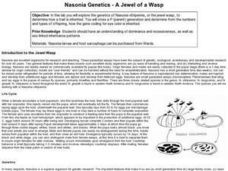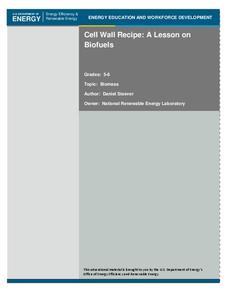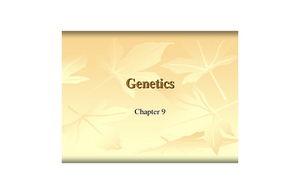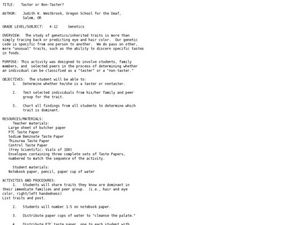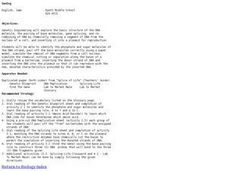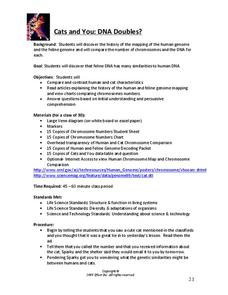Curated OER
Cracking the Genetic Code
Students investigate different purposes for manipulating DNA. After reviewing the structure and functions of DNA, students explore topics related to the use or manipulation of DNA and the potential benefits and problems, later making a...
Curated OER
How Is the Genetic Code Ultimately Translated Into a Protein?
Students examine the functions of mRNA, rRNA and tRNA. They explain the steps in the protein synthesis process. They practice using new vocabulary as well.
LABScI
Genetic Equilibrium: Human Diversity
Investigate the Hardy-Weinberg Principle to explain genetic equilibrium. The 10th lesson plan of a series of 12 is a laboratory exploration of genetic equilibrium. Your classes use a mixture of beans to model allele and genotype...
Curated OER
Genetics Edited: Translation and Review
Pupils complete a short review on the relationship between RNA and DNA. As a class, they take notes on the processes of translation and identify examples. To end the lesson, they complete a genetic code worksheet and share their answers.
Curated OER
Cracking the Code - Cloning Paper Plasmid
Students explore the "genetic code." They observe how genes may be manipulated for genetic research, gene cloning, and genetic engineering. In a lab setting, students examine the mechanics involved in cutting and ligating DNAs into a...
Curated OER
Design Yer Genes
Seventh graders explore general structure of and natural changes that occur in DNA strands, and discuss concept of genetic engineering by creating small portion of strawberry chromosome with three genes, modeling naturally occurring...
Curated OER
Nasonia Genetics-A Jewel of a Wasp
Students investigate the inheritance pattern of eye color in Nasonia wasps. In this genetics and inheritance lesson plan, students read about the life cycle of Nasonia wasps and hypothesize about the possibilities of eye color inherited...
Curated OER
Cell Wall Recipe: A Lesson on Biofuels
Biotech engineers discover that changes in the DNA code for cell wall formation can help create crops better suited for biofuel production. They extract DNA from wheat germ. They decode paper strips with codes and relate the activity to...
Curated OER
Genetics
Students create a checklist of traits common in all of their families. Uisng a table, they compare and contrast their family members to non-family members. They also review dominant and recessive traits and discuss how knowing about...
Curated OER
Cracking Codes and Ciphers
Students explore different codes and ciphers including Morse Code, Egyptian Hieroglyphs, and the Alphabet. They discuss how and why codes are used. Students create their own code and message to exchange with classmates.
Beyond Benign
Lucky Brand Genes: Chromosome Cookies
Mutations are not just deformed creatures we see in movies—they happen every day! Scholars study the different types of genetic mutations in the 12th installment of a series of 18 lessons. A creative activity uses candy and other food...
Beyond Benign
Kitten Creation
Your pupils become geneticists as they create cat offspring. The next instructional activity in a series continues an exploration of genetic makeup as scholars consider parent traits to build their offspring. Using household items, they...
Curated OER
Teacher Preparation Notes on Genetics
Students explore genetics through various hands-on activities. In this biology lesson, students predict the probability of offspring genotypes and phenotypes using the Punnett Square. They explain the causes of genetic abnormalities.
Curated OER
Translating Genetic Information
Students explore the process of translation. They determine the correct sequencing and present their strands to the class. In addition, they compare normal red blood cells to sickle cells and complete discussion questions.
Curated OER
Island Biogeography and Evolution: Solving a Phylogenetic Puzzle With Molecular Genetics
Learners engage in solving a logic problem based on real organisms and real data. They develop phylogenies for seven related populations of lizards living on the Canary Islands.
Curated OER
Taster of Non-Taster?
Students investigate their own inherited traits by using taste papers. In this genetic traits lesson, students test their ability to taste various substances, which is determined by inherited genetic traits. They take home taste papers...
Curated OER
GenEng
Students investigate the process of genetic engineering. In this genetic engineering lesson plan, students use paper models of DNA and plasmid bacterium to investigate the process of replicating DNA, splicing genes from DNA, and...
Curated OER
Heredity (Mendelian Genetics)
Students observe and record observations of whether a person is a taster or nontaster. They test selected individuals from their families and peer groups and chart all findings to determine which trait (e.g. taster or non-taster) is...
Curated OER
Secret Codes
Students practice writing and decoding secret messages before discussing DNA and its role as a code for making proteins. They translate DNA into RNA and identify the sequence of amino acids to find a secret message. An interactive...
Beyond Benign
Cats and You: DNA Doubles?
What do cats and human DNA have in common? The second lesson of a series focuses on the mapping of mammal genomes. Scholars learn about the structure of DNA as they compare the chromosomes of humans and felines.
Curated OER
Happy Face Spider Propagation
Students research genetic adaptations. In this chromosome lesson, students investigate dominant and recessive genes using spiders indigenous to Hawaii. Students create Punnett squares to determine the probability of passing specific...
Curated OER
Genetics and Molecular Biology
Students create DNA models using colored construction papers. In this biology instructional activity, students identify enzyme restriction sites. They model how DNA plasmids replicate when taken up by a bacterial cell.
Curated OER
Taster or Non-Taster?
Learners conduct a simple experiment to determine if a trait has been passed from a family member to them.
Curated OER
Reaching Into Your Genes
Students interact with a video to explore the basis for the science of chromosomes. They perform a chromosomal analysis called a karyotype and explore how seemingly minute errors in chromosomes can lead to devastating illnesses.






